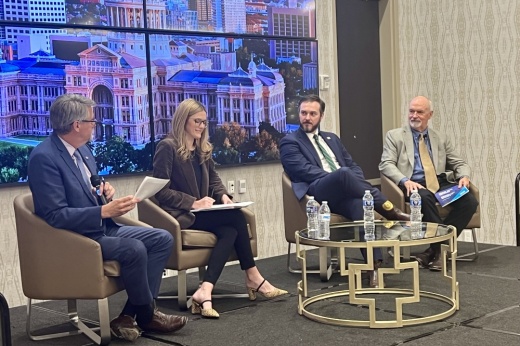When the session begins in January, lawmakers will have access to $149 billion in general revenue funds, which will be used to support a variety of programs across the state. According to a revenue estimate from Comptroller Glenn Hegar, a $27 billion surplus will also be available, due to unexpected money coming to the state as a result of inflation, high gasoline prices and more.
Financing education
The top spending priority for Texas voters is public education, according to John Hryhorchuk, the senior vice president of policy and advocacy for Texas 2036, a public policy organization.
From Sept. 6-11, Texas 2036 surveyed 1,000 Texas voters about their opinions on major policy topics and the future of the state. When asked how the $27 billion surplus should be spent, survey respondents said they would allocate 20% of the surplus to public schools, on average.
According to Texas 2036, 79% of voters were in favor of raising wages for teachers.
Hryhorchuk said he expects to see “a lot of money [and] a lot of discussion” going toward education during the legislative session. He emphasized the importance of “[making] sure that the students who graduate from our public schools are capable of filling the jobs of tomorrow.”
Texas ranks 33rd in the nation for education, according to the 2022 Kids Count Data Book, a report from the Annie E. Casey Foundation.
Community college finance was also discussed during the event. The Texas Commission on Community College Finance was established by lawmakers in 2021 and tasked with finding a new way to fund community colleges.
On Oct. 18, the commission unanimously approved its recommendation to overhaul the state’s complicated allocation system and focus primarily on measurable student outcomes, which include graduation and transfer rates, credentials of value and credentials earned for high-demand fields.
The recommendations, which have been widely supported by educators and workforce leaders across Texas, were provided to the Legislature in early November. Commission leaders will work with lawmakers to draft a bill ahead of the session.
The commission “is recommending substantial upticks in financial alignment so that community colleges are rewarded and incentivized to specifically work with businesses to meet workforce demand,” Hryhorchuk said.
Infrastructure and development
Lawmakers are also likely to invest in infrastructure, such as highway repairs and flood prevention, Hryhorchuk said. Access to broadband is also an important issue for the state, he said. A portion of broadband funding came from federal funds during the height of the COVID-19 pandemic, which are set to expire soon.
Panelists also discussed chapters 311, 312 and 313, which are part of the Texas tax code. Under chapters 311 and 312, counties are allowed to issue property tax abatements to attract companies to the area, according to Carlton Schwab, CEO of the Texas Economic Development Council.
Schwab said, under Chapter 313, school districts can enter a “bounding limitation agreement” that limits property taxes for 10 years.
However, these chapters must be regularly reauthorized by the Legislature. Lawmakers did not reauthorize Chapter 313, meaning the provisions will go away Dec. 31.
To continue to attract major companies and large projects to Texas, Schwab said lawmakers must pass a new bill that is similar to Chapter 313.
“It is absolutely critical for Texas to remain competitive,” said Megan Mauro, the senior vice president of policy and advocacy for the Texas Association of Business. “... We’ve seen projects that chose other states for these huge developments that would’ve brought [millions to Texas].”
Schwab said a bill replicating Chapter 313 is likely to pass in the Texas House, but in the Texas Senate, “it’s gonna be narrow under the best of circumstances.”
The 88th Texas Legislature convenes on Jan. 10, 2023.





